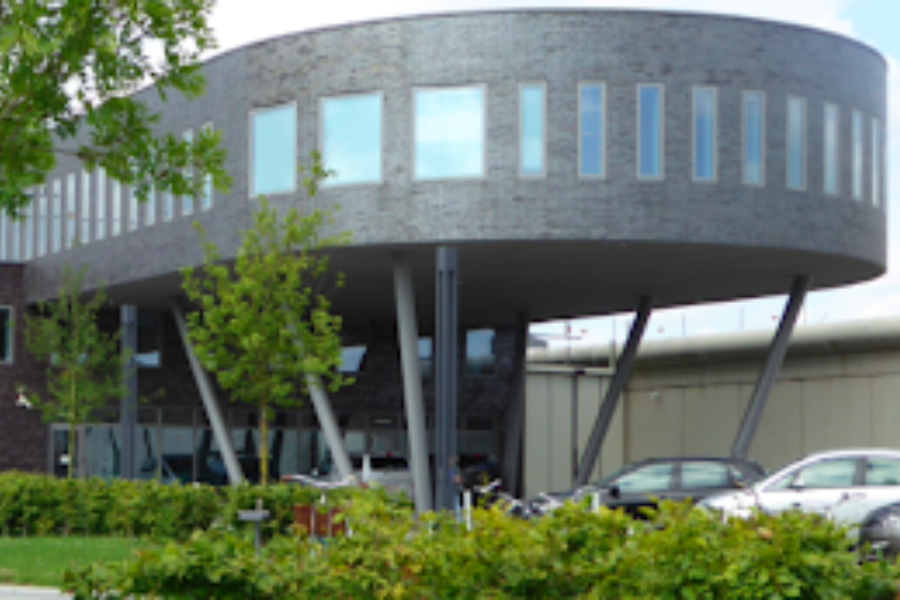
Over the past five years I have been hearing about the Forensic Psychiatric Centers (FPCs) operating in Belgium. I first heard about FPC Ghent and then later FPC Antwerp. Hearing and reading about these centers, which utilize a unique way of providing both security and treatment for justice-involved individuals with psychiatric problems, is very different from seeing them in action. In June 2022, I was able to visit FPC Ghent and observe not only a unique facility design but also a comprehensive and individualized approach to treatment.
In Belgium, internment is the most severe security measure to compel offenders with psychiatric problems to undergo treatment. These individuals have committed a crime but suffer from a mental disorder that makes them unable to control their actions. It is the Chamber for the Protection of Society that determines how that internment measure is implemented. They can do the following:
- Choose the penitentiary or psychiatric institution, or the place where the individual will stay;
- Allow the individual to go to work during the day and return to the institution in the evening (or spend a few days with family or friends or in a reception center); or
- Decide to transfer them to another institution.
The need for care and associated security level determines the risk level of the institution where an individual is placed.
Most patients at FPC Ghent have previously been placed in prison for an average of five years before they can be placed at the FPC. While they receive some treatment in the security-focused prison, the movement to the FPC affords them a customized treatment plan in a normalizing environment surrounded by staff that is focused on treatment. FPC Ghent seeks to reduce the risk of the individual committing a new criminal offense and removing the underlying causes of the criminal behavior or making it manageable, so that a return to society and the community is safe and possible.
FPC Ghent accepted their first patients in November 2014. They are currently able to serve 264 individuals. Prior to its opening there was a lot of research done to ensure that the program delivered an evidence-based forensic model of treatment. The result is a comprehensive model that emphasizes the following:
- Bio psychosocial model;
- RNR;
- Good Lives Model;
- Environmental Therapy;
- Restorative view on forensic care; and
- Supportive services based on the individual needs.
When a patient first arrives at FPC Ghent, they enter observation and orientation. Other living units that they may progress through are intensive treatment, re-socialization, and reintegration. Their individualized treatment plan is based on their diagnosis and treatment goals, which staff develop in collaboration with patients. These goals are focused on reducing the risk that their previous behaviors have posed to them and to society. The engagement and participation of the patient in the treatment plan is an active process and not one that simply looks good on paper.
There are five patient profiles that have been developed to provide care paths for patients. The profiles are:
- Antisocial;
- Personality problems or multiple personalities;
- Psychotic;
- Physical and violent behavior; and
- Paraphilic disorders and sexual offender behavior.
For each individual, a program is developed based on their strengths and needs. The program includes verbal and non-verbal therapies; meaningful daily activities such as workshops, education, sports, and leisure activities; participation in mini-society experiences such as the library and supermarket; work; and comprehensive medical care and treatment. Everything throughout the day has a purpose. This was evident as I observed even casual interactions between staff and patients.
Some of the unique therapies that were observed were drama therapy, music therapy, programs that change every six months based on needs and expectations such as computers and smartphones, vocational training, and crafts. Each housing unit has a member on the patient council. While this is not unique compared to other institutions providing security and treatment, what is unique is how they meet with and influence the director. This has resulted in a motivated and active council.
Staff in this facility have received both initial and ongoing training specific to their responsibilities. While they are trained to be able to engage in physical interactions and self-defense, they are most focused on de-escalation techniques. They are also very aware of and prepared to deliver responses to early warning signs of individual patients. They receive training monthly on various interventions. Their focus is on the team, how they work together as a whole, and how they support one another for the benefit of the client. The only uniformed staff that I observed were at the secure entry to the facility. Based on observation, the staff is diverse, range in age and gender, showed respect to patients and colleagues, and knew the patients and their needs. Every staff person was able to share what they do, celebrate the successes of patients, and articulate how their area of responsibility contributed to individual treatment plans. There was a professional and collegial atmosphere among staff.
The physical plant of FPC Ghent is a significant part of the program. It was designed to deliver and support treatment, as well as independent and normalized movement of patients in specific areas (while also being secure). It is bright with natural light, clean, has designated spaces for a wide range of program delivery, and provides privacy for patients. Each living unit is large enough to function as a small community and has individual rooms that are much like a small apartment or university dorm rooms.
The facility does utilize isolation rooms; however, they are not like any I’ve observed in other facilities. They are large and have natural light. While touring one of these areas where a patient was in a room, I was advised to be quiet and ask questions later because the patient was sensitive to noises. The focus of the staff person was on the patient and what they needed even while being isolated. This is a treatment approach to managing risk and security.
Overall, FPC Ghent offers hope to justice-involved individuals (and their families) who have struggled, often for years, with psychiatric problems that have made them unable to control or manage behaviors that then led to crime and imprisonment. The program continues to evolve and is now exploring how they might add virtual reality to their menu of evidence-based therapies and programs. To reduce the waiting list and the limitation of only being available for Dutch-speaking patients to this point, additional FPC facilities are planned for implementation over the next three years. One area for future focus is how they may extend treatment into the community to better support the delivery of ancillary and reintegration treatment and services.
* References available upon request.

Cherie Townsend is the IACFP Executive Director. She also works as an executive coach and consultant. Ms. Townsend previously worked as a leader and practitioner in juvenile justice systems for nearly 40 years.

